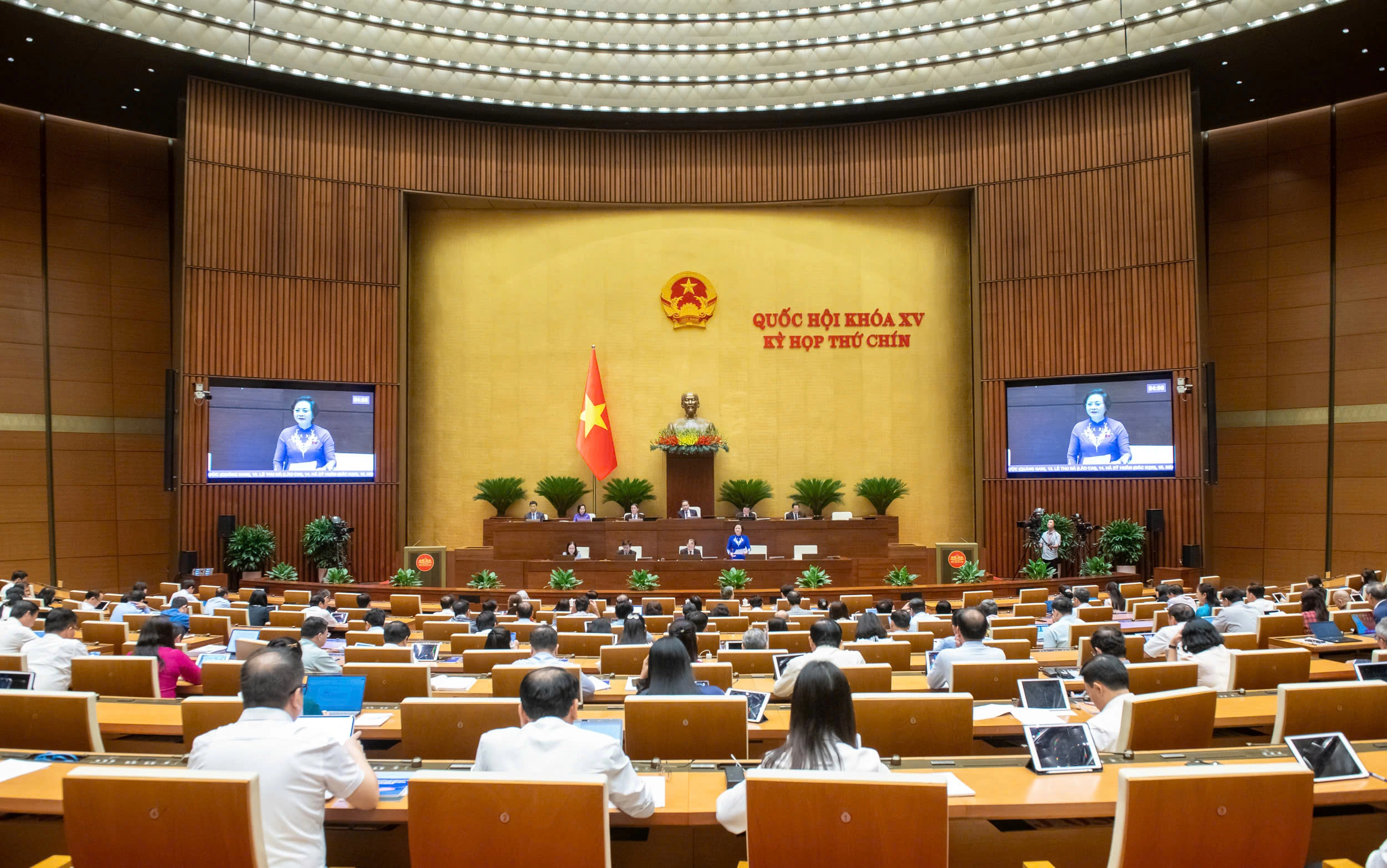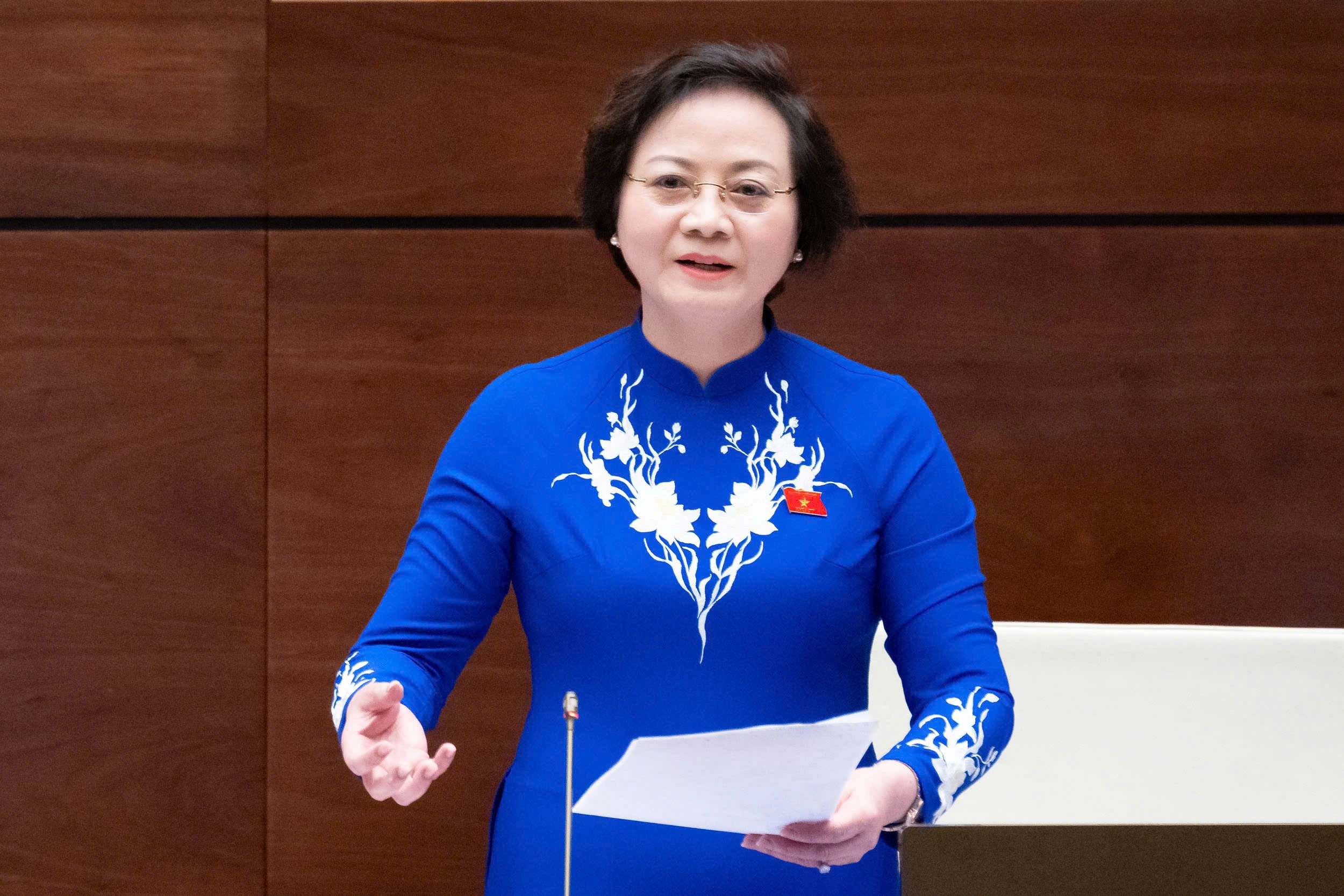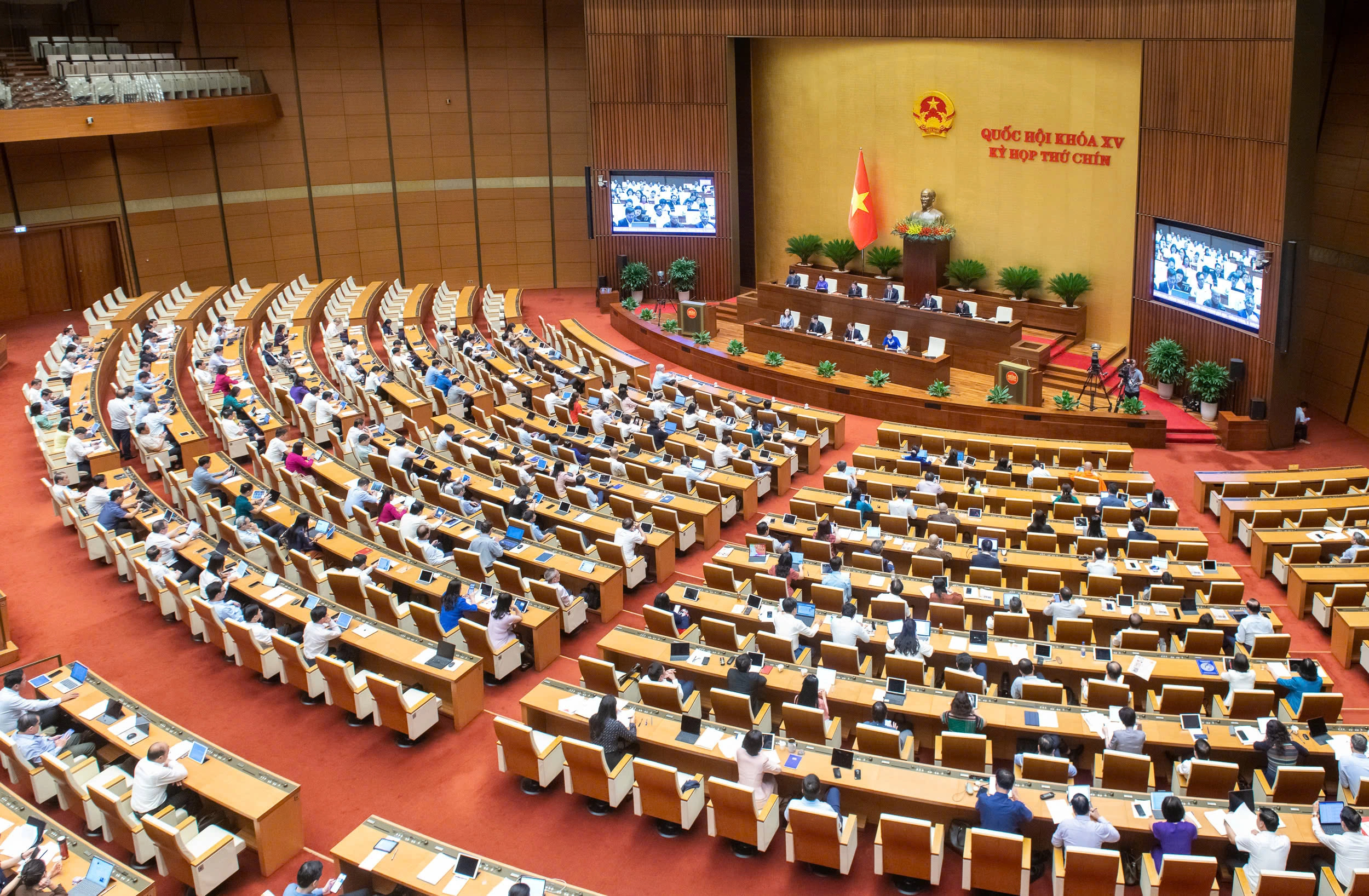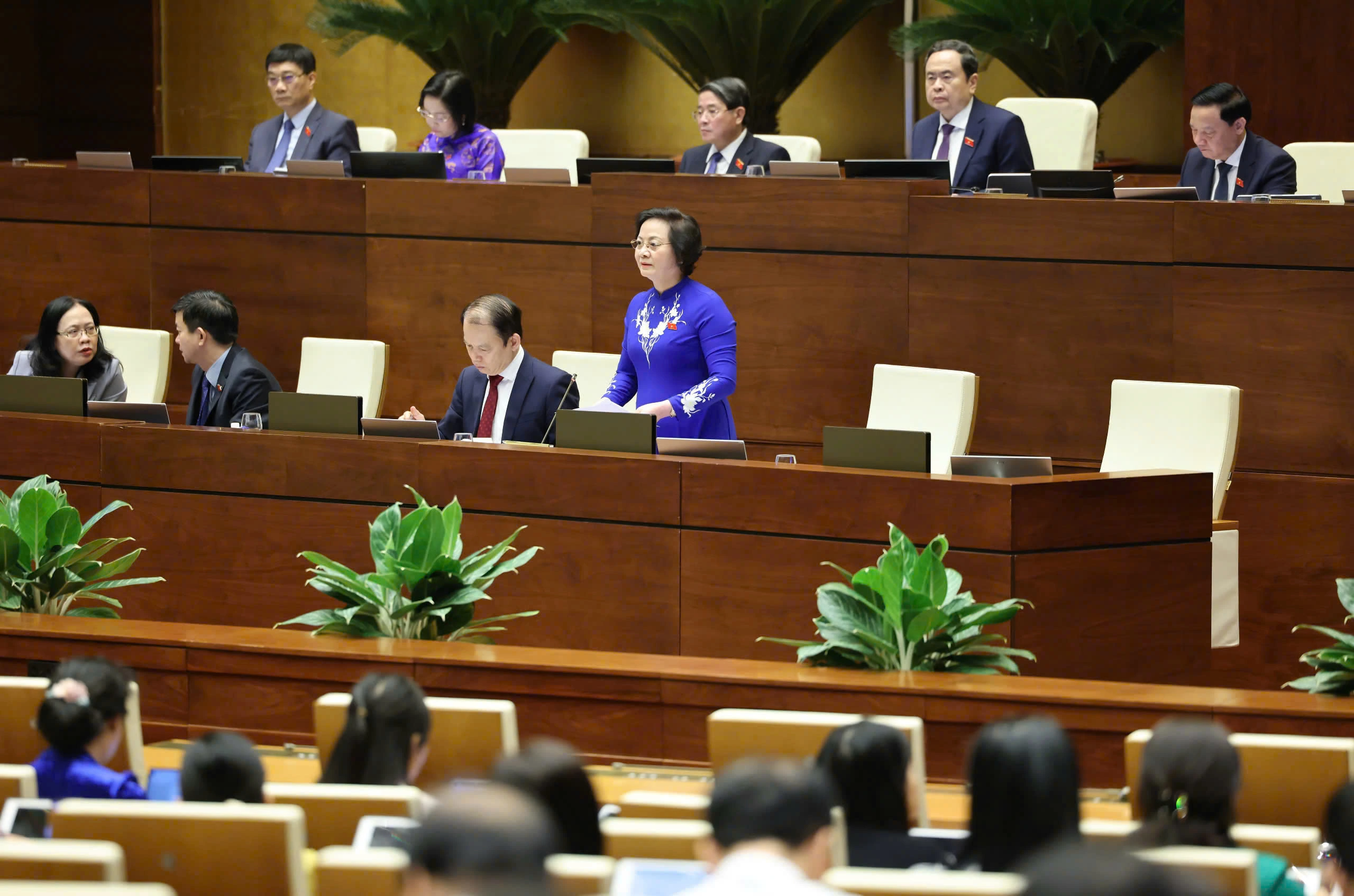Minister of Home Affairs Pham Thi Thanh Tra called this a historic milestone in Vietnam's legislative system.
After a full session listening to the opinions of National Assembly deputies discussing the draft revised Law on Organization of Local Government, on the morning of May 14, Minister of Home Affairs Pham Thi Thanh Tra emphasized that this is an extremely meaningful draft law for the State administration.
Constructive reform, determined to innovate
Along with this law amendment, the Minister also commented on the "historic milestone" of Vietnam's legislative system when for the first time in nearly 80 years since the country's founding, on the basis of the Party's major policy, the National Assembly considered and will decide to change the local government model from 3 levels to 2 levels.
"This is a comprehensive institutional and administrative reform of profound constructive nature, reflecting the strategic vision and determination to innovate so that the country is qualified to firmly enter the new era," the Minister of Home Affairs emphasized.
According to the Minister, there have been many remarkable breakthroughs such as shifting from administrative management thinking to governance, creation and service; from administrative division to decentralization, delegation of power, and clear and substantial empowerment; from a cumbersome, multi-layered local administrative apparatus to a streamlined local administrative system that is closer to the people, serving the people better.
Explaining some specific issues, Minister of Home Affairs Pham Thi Thanh Tra mentioned the principles and consistent elements of the draft law to change local administration. Accordingly, the Minister said that the drafting committee has built the bill focusing on 4 basic elements.
One is to establish the legal structure of the two-level local government on the basis of compliance with a number of articles related to the amended Constitution, the basis of institutionalizing the Party's policies in the spirit of Resolution 60 of the Central Committee, according to Conclusions 126, 127, 137 of the Politburo , the Secretariat and a number of major policies of the Party in the overall revolution of streamlining the apparatus.
Minister of Home Affairs Pham Thi Thanh Tra (Photo: Hong Phong).
Second is to inherit, supplement, and clearly define the authority of decentralization, delegation, and authorization. Minister Tra emphasized that this is also the core content with the goal of clearly decentralizing, delegating, and authorizing between the Central and local levels, between local authorities, as a legal basis for the entire specialized legal system to be amended, supplemented, or newly built.
"These are principled factors for specialized laws to base on for amendments and supplements, while promoting the proactiveness, dynamism and creativity of local authorities according to the motto of local decision, local action, local responsibility, as General Secretary To Lam has repeatedly emphasized," Minister Tra emphasized.
The third core content, according to the Minister, is to clarify the authority, tasks, and powers of each level of local government to suit the requirements of local governance in the new situation and new development stage of the country.
The fourth content the Minister mentioned is to establish a complete and comprehensive legal basis to remove all difficulties, barriers and obstacles when converting local government from 3 levels to 2 levels, but associated with the immediate implementation of decentralization, delegation and authorization requirements according to the policy of the Politburo and the Central Executive Committee, for local implementation.
Establishing creative and flexible local management mechanisms
Delving into the contents that National Assembly deputies are most interested in, Minister of Home Affairs Pham Thi Thanh Tra mentioned the principles of decentralization, decentralization, delegation of authority and authorization.
According to the Minister, this content is basically inherited from the law issued in February, but this draft law has further improved legislative techniques to ensure political, legal, administrative requirements, and guidance for timely amendment and supplementation of specialized laws. These are also the basic factors that determine the operational efficiency of two-level local governments.
Delegates attending the 9th session of the 15th National Assembly (Photo: Hong Phong).
"This draft law fully establishes the principles, scope, subjects, content, forms, and conditions for decentralization, delegation of authority, along with a control mechanism to ensure the promotion of the role of local authorities in deciding, organizing implementation, and taking responsibility for performing all assigned tasks," the Minister of Home Affairs emphasized.
The second content, according to the Minister, is to ensure the spirit of Resolution 27 of the Central Committee on State power is unified but has appropriate division of labor among the implementing agencies of the legislative, executive and judicial branches, especially between the Central and local levels.
In the principle of decentralization, decentralization, and delegation of authority, the Minister said that the drafting agency has coordinated with the reviewing agency to carefully and thoroughly review and anticipate arising issues to establish a creative, flexible, and dynamic management mechanism for local authorities.
"This regulation aims to ensure that, when necessary, the People's Committee or the Chairman of the Provincial People's Committee must promptly resolve arising issues, so that the flow of management is smooth, without stagnation or interruption," the Minister stated his opinion and emphasized that although decentralization and delegation of power is necessary, it is not lax.
Abolishing district level still ensures smooth flow of administration
Many delegates when speaking about this content wondered "what is a necessary case?". This was also explained more clearly by the Minister of the Interior.
According to the Minister, necessary cases are when specialized agencies or communes do not have enough capacity to perform certain tasks; when urgent, complicated, sensitive issues arise that exceed the ability of subordinates to handle; when sudden, unusual tasks require quick and timely response; when the Chairman of the Provincial People's Committee determines that there are signs of stagnation or avoidance; or situations that require inter-regional coordination and regulation...
Minister of Home Affairs Pham Thi Thanh Tra emphasized the orientation of establishing a creative, flexible and dynamic management mechanism for local authorities (Photo: Hong Phong).
"Practices are very diverse and rich. Without this mechanism, we really cannot ensure the requirements for smooth, interconnected, unified, and effective operation," the Minister emphasized, adding that the Law on Government Organization also has a provision assigning the Prime Minister to handle situations when necessary.
Previously, delegate Tran Thi Thanh Huong (An Giang) expressed her opinion that when there is no district-level organization, many tasks and powers are assigned to the commune level, leading to a significant increase in workload.
Therefore, Ms. Huong agrees with the provisions in the division of authority of local authorities at all levels, that "in necessary cases", the People's Committee and the Chairman of the People's Committee at the provincial level directly direct and manage the settlement of issues within the tasks and powers of specialized agencies and other administrative organizations under the People's Committee at their level, the People's Committee and the Chairman of the People's Committee at the commune level.
The female delegate proposed to supplement or assign the Government to specify more clearly and strictly when necessary to make it easier for the People's Committee and the Chairman of the People's Committee at the provincial level to clearly demonstrate their responsibilities, as well as ensure the implementation of the tasks and powers of the local government at the commune level in the short and long term.
According to Minister of Home Affairs Pham Thi Thanh Tra, there are currently 177 laws regulating the authority of ministers, 152 laws regulating the specific authority of the Prime Minister, and up to 170 laws regulating very specifically the authority of People's Councils and People's Committees at the district level. The Minister emphasized that these are tasks that "must be handled".
The Minister of Home Affairs added that through review, there are 474 out of 104 laws, 249 decrees, circulars and will decentralize 140 tasks to local authorities, reassign authority to commune-level authorities 300 tasks along with 90/99 tasks in current laws.
Immediately after the bill was passed by the National Assembly, the Minister said the Government would have to issue 25 decrees to implement the Law on Organization of Local Government, in order to promptly decentralize, delegate, and authorize local governments according to the new organizational model.
Dantri.com.vn
Source: https://dantri.com.vn/noi-vu/chinh-quyen-dia-phuong-2-cap-la-buoc-chuyen-dot-pha-sau-80-nam-lap-nuoc-20250514124643891.htm













![[Video] Hanoi recruits additional students for grade 10 of public high schools: Expanding opportunities for students](https://vphoto.vietnam.vn/thumb/1200x675/vietnam/resource/IMAGE/2025/7/19/16eff35c4ef049adbb5d45e8fec14e86)

























































































Comment (0)